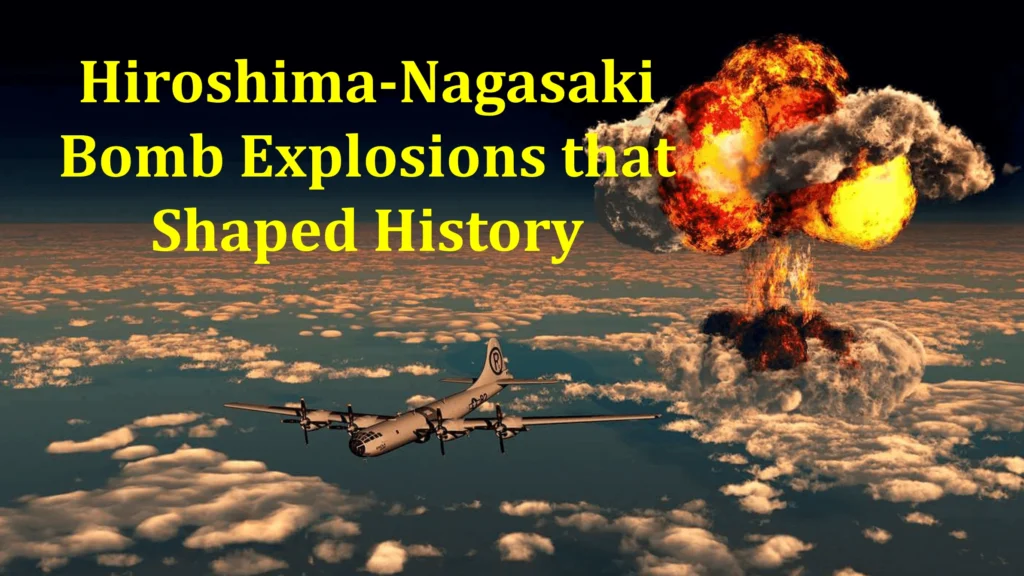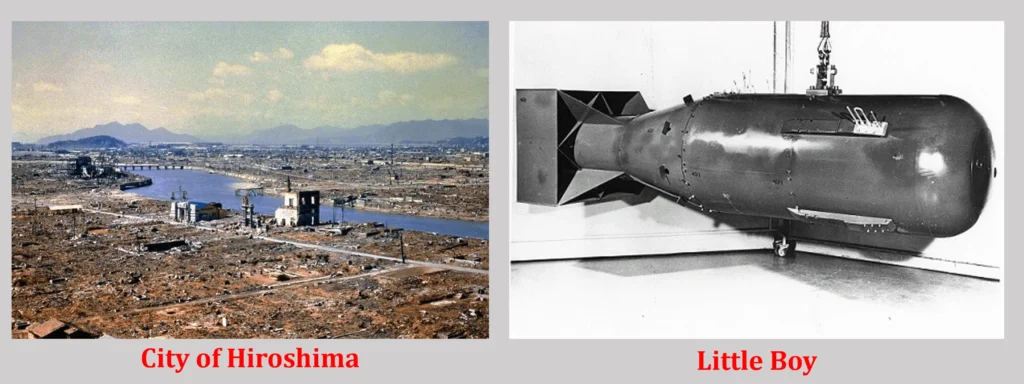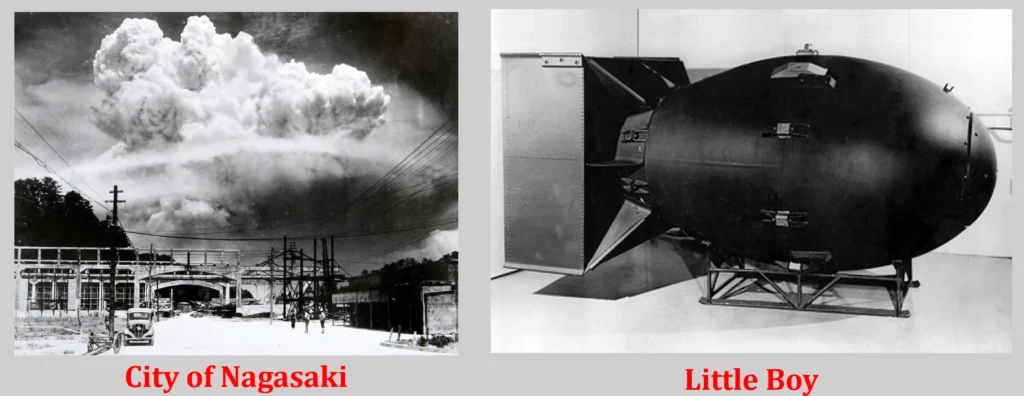
My heart becomes heavy the moment I come across the two dates of August,1945 i.e., 6th and the 9th. It was when the atomic bomb was dropped over Hiroshima-Nagasaki. The explosion brought before the human civilization the devastating consequences of nuclear warfare. These tragic events marked the culmination of World War II. It ushered in a new era defined by the unimaginable destructive power of nuclear weapons. I take this chance to write for you all about the great suffering that innocent people endured due to these explosions. So, let’s begin todays journey with compassion and with the aim to learn from the past mistakes which took away numerous innocent lives.
The Hiroshima Bombing: Unprecedented Destruction
It was on 6th August,1945 when an atomic bomb with the codename “Little Boy,” was dropped on the city of Hiroshima, Japan by the United States of America. Little Boy exploded with a force that was equivalent to approximately 15,000 tons of TNT as mentioned in the reports.

No one had ever imagined that the destruction would be immediate and beyond expectation. This explosion ended nearly 70,000 lives and caused everlasting injuries to more than ten thousand people. Buildings and infrastructure within a radius of 1.5 miles were reduced to rubble, leaving the city in ruins.
Not only the immediate effect of the bomb was terrifying, but it left the survivors with long-term health consequences. These survivors were known as hibakusha. Many Hibakusha suffered from radiation sickness, cancer and other severe illnesses. These illnesses became the part of their painful life and ended with their last breath. The bombings resulted not only in the physical scars, but the psychological impact was even more painful for the survivors and the people around the globe.
The Nagasaki Bombing: A Double Tragedy
The humanity was still under distress with the aftermath of bombing on Hiroshima when another atomic bomb this time named as “Fat Man” was dropped on Nagasaki, Japan on 9th August 1945. Only three days after the bombing of Hiroshima, Japan and the entire world was once again terrified with the atomic power of United States. The crowded Urakami Valley was chosen for the explosion causing a shocking amount of death and destruction. Approximately 40,000 people lost their lives and the number of people who suffered injuries was beyond the count.

The bombing of Nagasaki made people even more aware of the horrors of nuclear warfare and strengthened the world’s understanding of the catastrophic consequences of such weapons. Like Hiroshima, Nagasaki too experienced immense suffering and loss, becoming a powerful symbol of the urgent need for peace and nuclear disarmament.
Reasons behind the use of Atomic Bomb
Many military, strategic, and political reasons combined together to result in a decision to drop atomic bomb on Japan. Some of the main factors that led to the decision to use atomic weapons were:
To end the War
The U.S. wanted to bring a swift end to the war with Japan, which had been fiercely resisting surrender. They had a hope that by using the atomic bombs, they would be able to force Japan to surrender unconditionally. This would avoid the need for a prolonged and costly invasion on Japanese islands.
Demonstrate Power
The development of the atomic bomb was a highly secretive and costly, the project was known as the Manhattan Project. The U.S. wanted to demonstrate its newfound nuclear capabilities to the world and showcase its power, particularly to the Soviet Union and other potential adversaries during the post-war era.
Save American Lives
After the death of U.S President Roosevelt on April 12th, 1945, Harry Truman became the new President. Harry Truman and U.S. military leaders were of the opinion that a full-scale invasion of Japan could result in significant casualties for American forces, as well as for Japanese civilians who were mobilized to defend their homeland. United states later stated that the motive behind dropping the bombs was to save lives on both sides. This statement remains highly debated as not even a dodo may accept this reason.
Coercing Surrender
The U.S. hoped that the destructive force of the atomic bombs would convince Japanese leaders that continuing the war was futile and that surrender was the only viable option.
Ultimately, on August 6, 1945, the atomic bomb was dropped on Hiroshima. On August 9, 1945, another bomb was dropped on Nagasaki. These led to the unconditional surrender of Japan surrendered on August 15, 1945, effectively bringing an end to World War II.
Legacy and Lessons Learned
The consequences of bombings on Hiroshima and Nagasaki totally changed the mindset of human towards nuclear weapons. Everyone around the world was compelled to think whether the use of these deadly weapons was right or wrong. Moreover, a movement to stop the spread of these nuclear weapons become the need of the hour. Various leaders started to work towards getting rid of them altogether.
In the aftermath of World War II, The United Nations was established as an international body to maintain peace and security in the world. It paved the way for the signing of treaties like the Treaty on the Non-Proliferation of nuclear weapons (NPT). The aim of this treaty was to prevent the further spread of nuclear weapons and encourage disarmament. The success of these organization and these treaties are a matter of debate in itself. But it cannot be neglected that a significant progress has been made to maintain the peace.
Remembering Hiroshima-Nagasaki: A wake up call.
Passionately supporting peace and working collectively for the elimination of nuclear weapons will be the true homage for the victims of these bombing. Each year, on August 6 and 9, people around the world come together to remember these events. They participate in various peace events and ceremonies. It is important for the countries to build up strong diplomatic relations. Further cooperate with each other in preventing such conflict in future. Governments across the globe must prioritize disarmament initiatives and redirect resources towards sustainable development and humanitarian aid.
Conclusion
The way the two cities Hiroshima and Nagasaki were bombed has added two dark chapters in the world history. We should understand no war has ever given anything good to the humanity. War is never a solution to any problem. The concept of non-violence which was adopted by Mahatma Gandhi. It not only made him a mass leader but a leader of many leaders. For him the path (non-violence) was important then the end result. The suffering and the damage caused by these two bombings had ignited the need of nuclear disarmament. So, let us all unite to form a global community and ensure that no such event is repeated in future.

One of the tragic day in history
Good information
Thanks for sharing this